讲课比赛 之 中考英语高频词汇辨析
初三英语专题讲解词汇的辨析
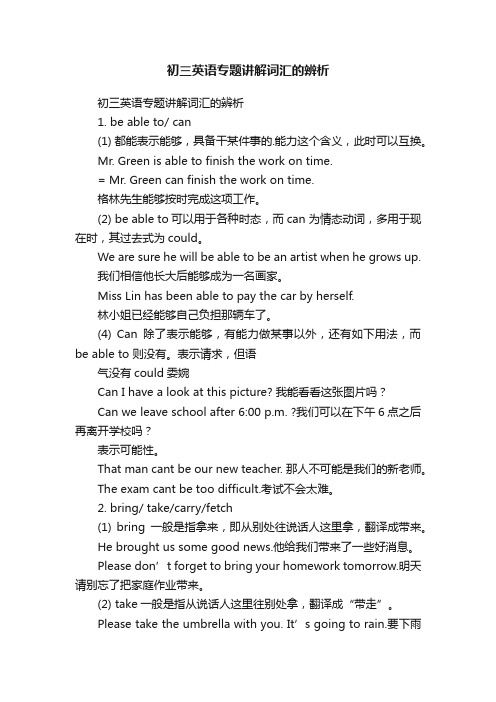
初三英语专题讲解词汇的辨析初三英语专题讲解词汇的辨析1. be able to/ can(1) 都能表示能够,具备干某件事的.能力这个含义,此时可以互换。
Mr. Green is able to finish the work on time.= Mr. Green can finish the work on time.格林先生能够按时完成这项工作。
(2) be able to可以用于各种时态,而can 为情态动词,多用于现在时,其过去式为could。
We are sure he will be able to be an artist when he grows up.我们相信他长大后能够成为一名画家。
Miss Lin has been able to pay the car by herself.林小姐已经能够自己负担那辆车了。
(4) Can除了表示能够,有能力做某事以外,还有如下用法,而be able to 则没有。
表示请求,但语气没有could委婉Can I have a look at this picture? 我能看看这张图片吗?Can we leave school after 6:00 p.m. ?我们可以在下午6点之后再离开学校吗?表示可能性。
That man cant be our new teacher. 那人不可能是我们的新老师。
The exam cant be too difficult.考试不会太难。
2. bring/ take/carry/fetch(1) bring一般是指拿来,即从别处往说话人这里拿,翻译成带来。
He brought us some good news.他给我们带来了一些好消息。
Please don’t forget to bring your homework tomorrow.明天请别忘了把家庭作业带来。
(2) take一般是指从说话人这里往别处拿,翻译成“带走”。
中考词汇总结高频词汇与词义辨析
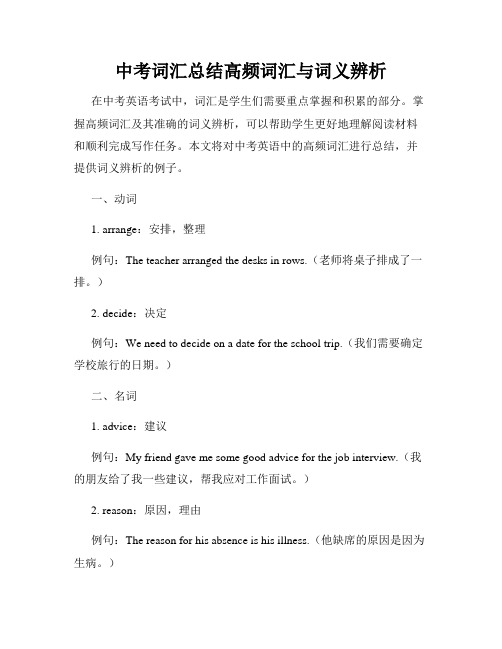
中考词汇总结高频词汇与词义辨析在中考英语考试中,词汇是学生们需要重点掌握和积累的部分。
掌握高频词汇及其准确的词义辨析,可以帮助学生更好地理解阅读材料和顺利完成写作任务。
本文将对中考英语中的高频词汇进行总结,并提供词义辨析的例子。
一、动词1. arrange:安排,整理例句:The teacher arranged the desks in rows.(老师将桌子排成了一排。
)2. decide:决定例句:We need to decide on a date for the school trip.(我们需要确定学校旅行的日期。
)二、名词1. advice:建议例句:My friend gave me some good advice for the job interview.(我的朋友给了我一些建议,帮我应对工作面试。
)2. reason:原因,理由例句:The reason for his absence is his illness.(他缺席的原因是因为生病。
)三、形容词1. polite:有礼貌的例句:Emily is always polite to her elders.(艾米莉对长辈总是非常有礼貌。
)2. honest:诚实的例句:He is an honest person and never tells lies.(他是一个诚实的人,从不说谎。
)四、副词1. quickly:快速地例句:She finished the race quickly and won the first place.(她迅速完成了比赛并获得了第一名。
)2. quietly:安静地例句:Please read quietly in the library.(请在图书馆安静地阅读。
)词义辨析:1. forget与remember虽然forget和remember都有“记住”的意思,但用法上有所不同。
forget表示“忘记”,后接名词或动名词,而remember表示“记得”,后接名词、动名词、动词-ing形式或从句。
中考英语高频词汇词组语法,重难点语法辨析
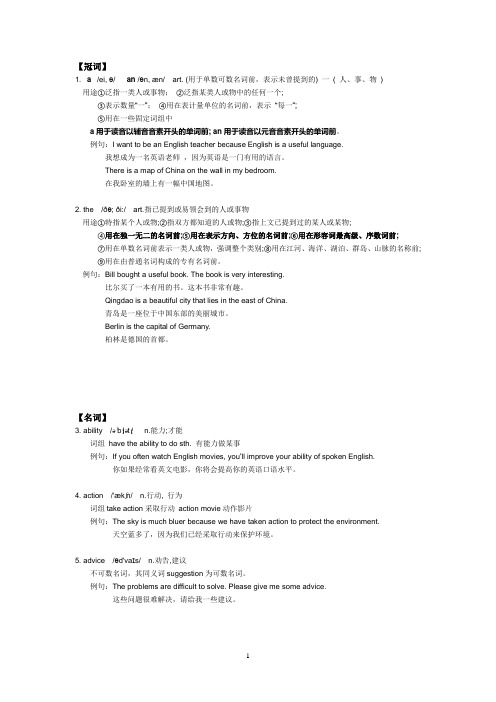
【冠词】1. a /ei, ə/ an /ən, æn/art. (用于单数可数名词前,表示未曾提到的) 一( 人、事、物)用途①泛指一类人或事物;②泛指某类人或物中的任何一个;③表示数量“一”;④用在表计量单位的名词前,表示“每一”;⑤用在一些固定词组中a用于读音以辅音音素开头的单词前; an用于读音以元音音素开头的单词前。
例句:I want to be an English teacher because English is a useful language.我想成为一名英语老师,因为英语是一门有用的语言。
There is a map of China on the wall in my bedroom.在我卧室的墙上有一幅中国地图。
2. the /ðə; ði:/ art.指已提到或易领会到的人或事物用途①特指某个人或物;②指双方都知道的人或物;③指上文已提到过的某人或某物;④用在独一无二的名词前;⑤用在表示方向、方位的名词前;⑥用在形容词最高级、序数词前;⑦用在单数名词前表示一类人或物,强调整个类别;⑧用在江河、海洋、湖泊、群岛、山脉的名称前;⑨用在由普通名词构成的专有名词前。
例句:Bill bought a useful book. The book is very interesting.比尔买了一本有用的书。
这本书非常有趣。
Qingdao is a beautiful city that lies in the east of China.青岛是一座位于中国东部的美丽城市。
Berlin is the capital of Germany.柏林是德国的首都。
【名词】3. ability /əˈbɪlətɪ/ n.能力;才能词组have the ability to do sth. 有能力做某事例句:If you often watch English movies, you’ll improve your ability of spoken English.你如果经常看英文电影,你将会提高你的英语口语水平。
中考英语词汇部分专题讲解:中考英语易混词汇辨析

中考英语易混词汇辨析及练习above/over/on词汇用法例句above “在……上方”,不一定含有垂直在上的意思。
反义词为:belowThe sun rose above the horizon.太阳升到了地平线以上。
over“在……上面”,含有垂直在上的意思There is a bridge over the river.河上有座桥。
on“在……上面”,含有与表面相接触的意思There is an oil painting on the wall.墙上有一幅油画。
across/through词汇用法例句across “横过,穿过”,指从……的一边到另一边Be careful when you walk across the road.当你过马路的时候要小心。
through“穿过”,强调从内部穿过The river flows through the city from west to east.这条河从西到东流过城市。
at all/after all词汇用法例句at all “全然,根本不”,一般用于否定句中加强语气She doesn’t like football at all.她一点也不喜欢足球。
after all “毕竟,终究,到底”,一般置于句首或句末作状语After all,he is a child.毕竟,他还是个孩子。
few/a few/little/a little词汇含义修饰名词肯定/否定例句few 几乎没有可数否定I am a new comer here,so I have few friends here.我刚来到这里,所以我在这里没有几个朋友。
a few有一些肯定Though the man has been here for only one month, he has a few friends.尽管这个人才在这里住了一个月,但他就有了一些朋友。
little 几乎没有不可数否定There is little water in the glass,so you can’t drinkany.杯子里几乎没有水了,你不可能喝到水了。
中考英语常用词语辨析.docx
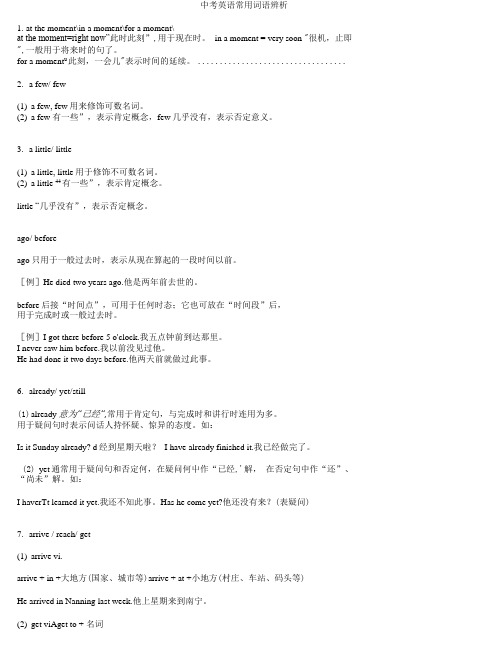
中考英语常用词语辨析1.at the moment\in a moment\for a moment\at the moment=right now”此时此刻”,用于现在时。
in a moment = very soon "很机,止即",一般用于将来时的句了。
for a moment u此刻,一会儿"表示时间的延续。
..................................2. a few/ few(1)a few, few用来修饰可数名词。
(2)a few 有一些”,表示肯定概念,few几乎没有,表示否定意义。
3. a little/ little(1)a little, little用于修饰不可数名词。
(2)a little 44有一些”,表示肯定概念。
little “几乎没有”,表示否定概念。
ago/ beforeago只用于一般过去时,表示从现在算起的一段时间以前。
[例]He died two years ago.他是两年前去世的。
before后接“时间点”,可用于任何时态;它也可放在“时间段”后,用于完成时或一般过去时。
[例]I got there before 5 o'clock.我五点钟前到达那里。
I never saw him before.我以前没见过他。
He had done it two days before.他两天前就做过此事。
6.already/ yet/still(1)a lready意为“已经”,常用于肯定句,与完成时和讲行时连用为多。
用于疑问句时表示问话人持怀疑、惊异的态度。
如:Is it Sunday already? d经到星期天啦?I have already finished it.我已经做完了。
(2)yet通常用于疑问句和否定何,在疑问何屮作“已经,'解,在否定句中作“还”、“尚未”解。
如:I haverTt learned it yet.我还不知此事。
《中考英语》核心词汇辨析

一、choose和pick的区别1. choose表示“选择”,强调从多个选项中做决定,具有较强的主动性和自由性。
例句:Everyone can choose their own path in life.每个人都可以选择自己人生的道路。
2. pick表示“挑选”,强调从多个选项中挑选出最好的或最合适的。
例句:I need to pick a dress for the party tonight.我需要挑选一件适合今晚聚会的裙子。
二、quiet和silent的区别1. quiet表示“安静的”,强调没有噪音或声音。
例句:Please be quiet in the library.请在图书馆保持安静。
2. silent表示“无声的”,强调完全没有声音。
例句:The room was silent when the teacher walked in.当老师走进教室时,整个房间都安静无声。
三、excite和exciting的区别1. excite表示“使兴奋”,强调对某事感到兴奋。
例句:The good news excited the whole class.这个好消息使全班同学兴奋不已。
2. exciting表示“令人兴奋的”,形容物品或事物本身具有令人激动的特性。
例句:The movie was so exciting that I couldn't help but shout.这部电影太令人兴奋了,我情不自禁地大声喊了起来。
四、plan和planning的区别1. plan表示“计划”,强调事先制定的安排或行动方案。
例句:We have made a detailed plan for the project.我们已经为这个项目制定了详细的计划。
2. planning表示“计划中的”,强调正在进行的一项计划。
例句:We are currently in the planning stage of the project.我们目前正在进行这个项目的筹划阶段。
全国中考英语高频词汇精解
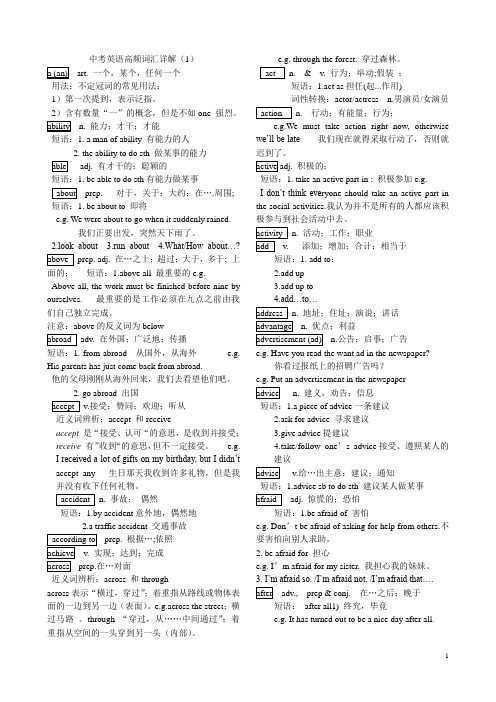
中考英语高频词汇详解(1)a (an) art. 一个,某个,任何一个用法:不定冠词的常见用法:1)第一次提到,表示泛指。
2)含有数量“一”的概念,但是不如one 强烈。
ability n. 能力;才干;才能短语:1. a man of ability 有能力的人2. the ability to do sth 做某事的能力able adj. 有才干的;聪颖的短语:1. be able to do sth有能力做某事about prep. 对于,关于;大约;在….周围; 短语:1. be about to 即将e.g. We were about to go when it suddenly rained.我们正要出发,突然天下雨了。
2.look about3.run about4.What/How about…? above prep. adj. 在…之上;超过;大于,多于; 上面的;短语:1.above all 最重要的e.g.Above all, the work must be finished before nine by ourselves. 最重要的是工作必须在九点之前由我们自己独立完成。
注意:above的反义词为belowabroad adv. 在外国;广泛地;传播短语:1. from abroad 从国外,从海外 e.g. His parents has just come back from abroad.他的父母刚刚从海外回来,我们去看望他们吧。
2. go abroad 出国accept v.接受;赞同;欢迎;听从近义词辨析:accept 和receiveaccept是“接受、认可“的意思,是收到并接受;receive有”收到“的意思,但不一定接受。
e.g.I received a lot of gifts on my birthday, but I didn’t accept any 生日那天我收到许多礼物,但是我并没有收下任何礼物。
中考英语重点词语辨析
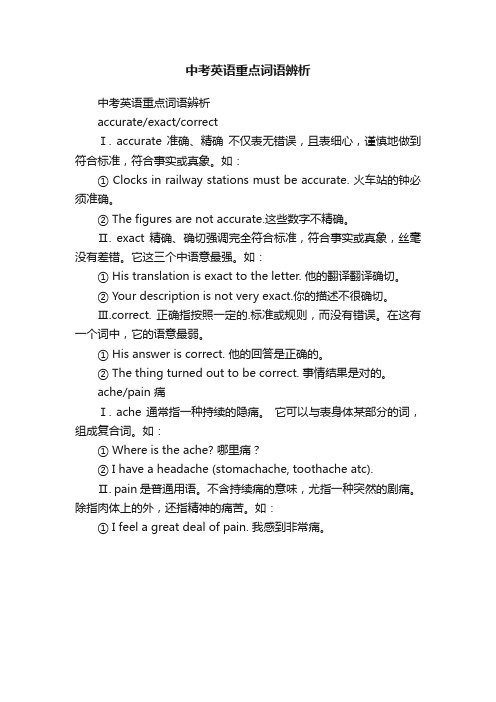
中考英语重点词语辨析中考英语重点词语辨析accurate/exact/correctⅠ. accurate 准确、精确不仅表无错误,且表细心,谨慎地做到符合标准,符合事实或真象。
如:① Clocks in railway stations must be accurate. 火车站的钟必须准确。
② The figures are not accurate.这些数字不精确。
Ⅱ. exact 精确、确切强调完全符合标准,符合事实或真象,丝毫没有差错。
它这三个中语意最强。
如:① His translation is exact to the letter. 他的翻译翻译确切。
② Your description is not very exact.你的描述不很确切。
Ⅲ.correct. 正确指按照一定的.标准或规则,而没有错误。
在这有一个词中,它的语意最弱。
① His answer is correct. 他的回答是正确的。
② The thing tu rned out to be correct. 事情结果是对的。
ache/pain 痛Ⅰ. ache 通常指一种持续的隐痛。
它可以与表身体某部分的词,组成复合词。
如:① Where is the ache? 哪里痛?② I have a headache (stomachache, toothache atc).Ⅱ. pain 是普通用语。
不含持续痛的意味,尤指一种突然的剧痛。
除指肉体上的外,还指精神的痛苦。
如:① I feel a great deal of pain. 我感到非常痛。
初三英语专题讲解词汇辨析
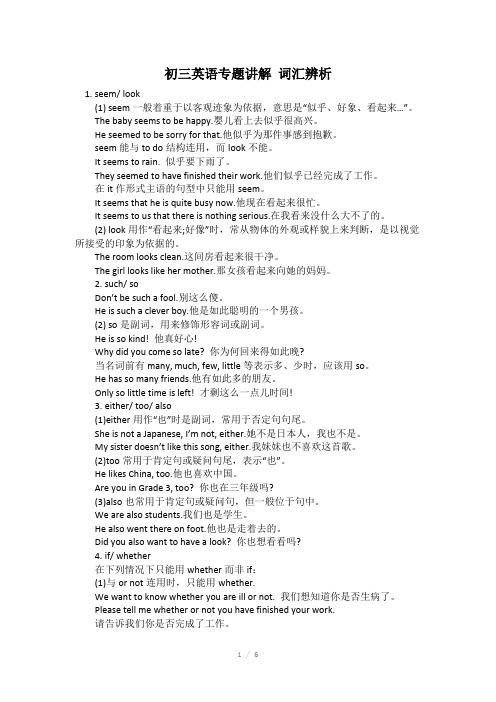
初三英语专题讲解词汇辨析1. seem/ look(1) seem一般着重于以客观迹象为依据,意思是“似乎、好象、看起来…”。
The baby seems to be happy.婴儿看上去似乎很高兴。
He seemed to be sorry for that.他似乎为那件事感到抱歉。
seem能与to do结构连用,而look不能。
It seems to rain. 似乎要下雨了。
They seemed to have finished their work.他们似乎已经完成了工作。
在it作形式主语的句型中只能用seem。
It seems that he is quite busy now.他现在看起来很忙。
It seems to us that there is nothing serious.在我看来没什么大不了的。
(2) look用作“看起来;好像”时,常从物体的外观或样貌上来判断,是以视觉所接受的印象为依据的。
The room looks clean.这间房看起来很干净。
The girl looks like her mother.那女孩看起来向她的妈妈。
2. such/ soDon’t be such a fool.别这么傻。
He is such a clever boy.他是如此聪明的一个男孩。
(2) so是副词,用来修饰形容词或副词。
He is so kind! 他真好心!Why did you come so late? 你为何回来得如此晚?当名词前有many, much, few, little等表示多、少时,应该用so。
He has so many friends.他有如此多的朋友。
Only so little time is left! 才剩这么一点儿时间!3. either/ too/ also(1)either用作“也”时是副词,常用于否定句句尾。
She i s not a Japanese, I’m not, either.她不是日本人,我也不是。
英语中考备考关键--重点词汇辨析(三)

英语中考备考关键--重点词汇辨析(三)16. speech, talk, lecturespeech 指在公共场所所做的经过准备的较正式的演说,talk 日常生活中的一般的谈话,讲话,lecture学术性的演讲,讲课a series of lecture on …speech指在公共场所所做的经过准备的较正式的演说His speech was well received.他的演讲很受欢迎。
talk日常生活中的一般的谈话,讲话I had a long talk with her.我和她长谈了一次。
lecture学术性的演讲,讲课a series of lecture on…He gave a lecture to his students on modern writers.他给学生们讲了关于现代作家的一课。
17. officer, officialofficer 部队的军官,official 政府官员an army officerofficer 更多地指长官,行政长官,军官等那些等级较高的官员。
official更多是指普通官员,公务员等。
18. work, job二者均指工作。
work 不可数,job 可数a good job。
都做名词时,有一些区别,简单说:*work 工作,多指生产或完成某物的体力的或脑力的努力或活动,不可数。
*job工作,任务,多指为换取报酬而进行的日常活动,尤指作为某人的手艺、行业或职业的工作。
可数Washing the windows is not my job.洗窗子不是我的事儿(任务)。
1.首先,我们不能说a work,只能说a job.2.job的工作可以是"零工"(如a part-time job 钟点工),但work却多指(全日制)的职业。
3.楼主的意思,一个工作中的一个小的项目,可以用a job, 但最好用assignment/mission/task,"任务"好一些。
英语班主任:中考英语常考50组重点词语辨析,提前背,一分不丢!
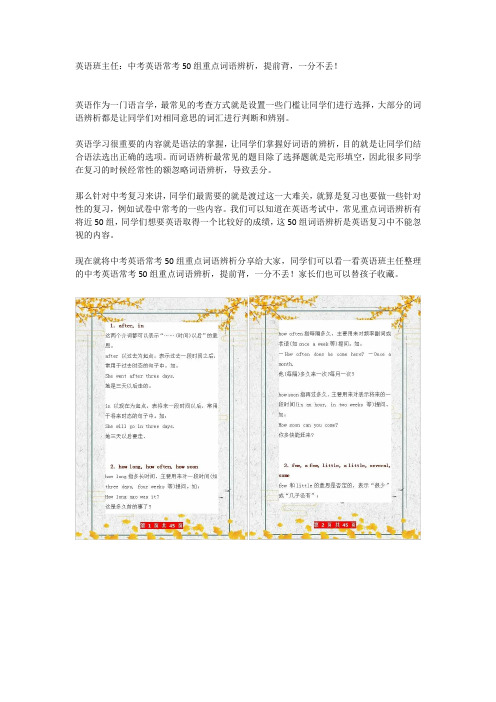
英语班主任:中考英语常考50组重点词语辨析,提前背,一分不丢!
英语作为一门语言学,最常见的考查方式就是设置一些门槛让同学们进行选择,大部分的词语辨析都是让同学们对相同意思的词汇进行判断和辨别。
英语学习很重要的内容就是语法的掌握,让同学们掌握好词语的辨析,目的就是让同学们结合语法选出正确的选项。
而词语辨析最常见的题目除了选择题就是完形填空,因此很多同学在复习的时候经常性的额忽略词语辨析,导致丢分。
那么针对中考复习来讲,同学们最需要的就是渡过这一大难关,就算是复习也要做一些针对性的复习,例如试卷中常考的一些内容。
我们可以知道在英语考试中,常见重点词语辨析有将近50组,同学们想要英语取得一个比较好的成绩,这50组词语辨析是英语复习中不能忽视的内容。
现在就将中考英语常考50组重点词语辨析分享给大家,同学们可以看一看英语班主任整理的中考英语常考50组重点词语辨析,提前背,一分不丢!家长们也可以替孩子收藏。
中考英语必背词语辨析
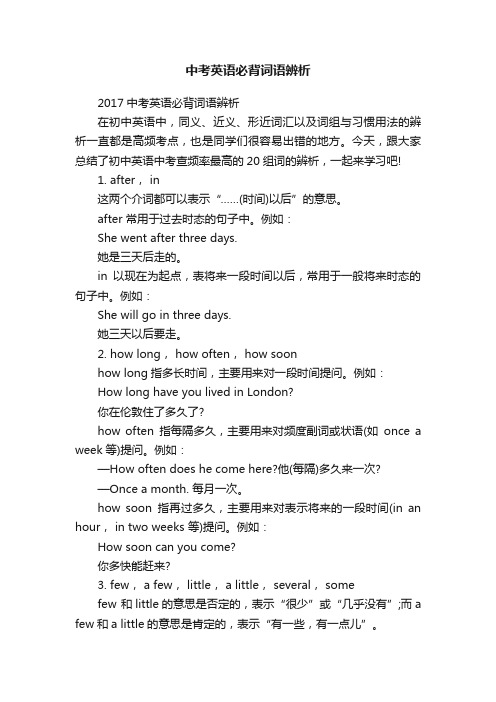
中考英语必背词语辨析2017中考英语必背词语辨析在初中英语中,同义、近义、形近词汇以及词组与习惯用法的辨析一直都是高频考点,也是同学们很容易出错的地方。
今天,跟大家总结了初中英语中考查频率最高的20组词的辨析,一起来学习吧!1. after, in这两个介词都可以表示“……(时间)以后”的意思。
after 常用于过去时态的句子中。
例如:She went after three days.她是三天后走的。
in以现在为起点,表将来一段时间以后,常用于一般将来时态的句子中。
例如:She will go in three days.她三天以后要走。
2. how long, how often, how soonhow long指多长时间,主要用来对一段时间提问。
例如:How long have you lived in London?你在伦敦住了多久了?how often指每隔多久,主要用来对频度副词或状语(如once a week等)提问。
例如:—How often does he come here?他(每隔)多久来一次?—Once a month. 每月一次。
how soon指再过多久,主要用来对表示将来的一段时间(in an hour, in two weeks 等)提问。
例如:How soon can you come?你多快能赶来?3. few, a few, little, a little, several, somefew 和little的意思是否定的,表示“很少”或“几乎没有”;而a few和a little的意思是肯定的,表示“有一些,有一点儿”。
few 和 a few修饰可数名词;little 和 a little 修饰不可数名词。
several用于修饰可数名词复数,语意比a few和some更肯定,含有“好几个”的意思。
some可修饰可数名词复数,也可修饰不可数名词,从数量上说,它有时相当于a few 或 a little,有时指更多一些的数量。
中考英语高频词汇辨析

中考英语高频词汇辨析情态动词should 、must、can、may的用法1. 表示能力时用can、could:a. --Can your brother speak Japanese?–Yes, he has learnt it in Tokyo for three years.2. 表示可能性:a. — Is that your best friend Simon? - No, it can’t be him. He flew to Hongkong yesterday.b. —My house is very near a busy street. —It can’t be very quiet.c. I’ m sure it can’t be John., I saw him off at the railway station just twenty minutes ago.3. 表示委婉的语气时用maya. —May I borrow your MP4 ,Daniel? —Sure. Here you are.b. —May I smoke here, please? —I am afraid you can’t . This is a non-smoking area.c. —Let's go to the supermarket by taxi. —We needn't take a taxi.d. It is not far from here. You have finished most of the work, so you needn’ t start working so early tomorrow4. 表示―禁止‖,语气强烈a. There is a ―No smoking‖ sign here. You mustn’t smoke.b. -- Must I hand in my homework now? –No, you needn’t, you can hand it in tomorrow.c. When traffic lights are red,we must stop and wait.d. Be polite. You mustn't talk to the old like that.e. — Must I park my car behind the building? — No, you don't have to. You may park it here.have gone to/ have been to1. —The Blacks have gone to the Phoenix Island(凤凰岛). — Oh, really? I have never been there before.2. —Where is Jim? —He has gone to the computer room.3. —Is that girl Amy? —No, she's Allen. Amy has gone to the library with her friend.4. —I want to return the book to Jack, but I can't find him. —He has gone to the library. You can find him there.5. Mr Wu is away on holiday. He has gone to Shanghai.6. Kitty’s uncle has been to Beijing twice.7. We have been good friends for more than ten years.8. How many times have you been to Yangzhou?频率副词1. —Did you play badminton yesterday? —Yes. But I never play badminton these days because my right foot hurts.2. He learns all by himself. He never goes to any training class.3. Alice seldom watches the news round-up, so she knows little about the world.4. I hate vegetables. I seldom eat them.the other、others、another、other1. This coat is too large. Would you please show me another one?2. I know there is a pen in your right hand. But what’s in your other (另一个)hand?3. she is always ready to help others.4. This morning Jack came to school much later than any other student in his class.5. We had a picnic last term and it was a lot of fun, so let’s have another one this month.6. If the question is answered incorrectly, another question will be given to you.Put on; take off ;Turn on/ off;turn up/ down1. Bob, put on your coat. It’ s cold outside.2. The man took off his coat as soon as he walked into the warm room..3. Tom, take off your T-shirt right now! It looks so dirty.4. Don’t forget to turn off the lights when you leave the room.5. The music from the radio sounds so beautiful. Could you please turn up the radio a little?6. Would you please turn down the TV a little? Jack is doing his homework.both, either,neither1. —Did your parents go to climb the Zijin Mountain last Sunday? —No They both went to see a film.2. —Would you like some juice or milk?—Either is OK. I don’t mind.3. There are two ways from here to the station. You can go either way.4. Would you like some coffee or tea? Neither , water is OK.5. Neither of them knows French, so I have to ask a third person for help.a few, few, a little ,little1. You've done a good job. You made few mistakes.2. There’s little cooking oil left in the house. Would you go to the supermarket and get some ?3. I can't buy the dress because I have just a little money.4. We’ll try our best to do the work with less money and fewer people.look at / for/ up/ after1. Parents, attention please. It's very crowded here. Look after your kids.2. The English—Chinese dictionary helps me a lot. I often look up new words in it.3. Look up the word in the dictionary,and you’ll get the meaning by yourselves.because,because of1. Yangzhou is more suitable for people to live in because of less air pollution.living & alive1. Jin Yong is one of the greatest and oldest living writers. He is still alive.surprised; amazing ;boring1. In the Science Museum, the children felt surprised to see so many amazing things.2. The film is boring, it makes me want to sleep.sometime在某个时间;some time一段时间;sometimes有时候;some times几次1. They are going to have a picnic sometime next week.except & besides1. —Why did you all go swimming exceptTom?—Because he was ill at home.Until& not …until1. They watched the train until it disappeared in the distance.2. You won't get the result of the test until the end of this month.3. The teachers did not leave the school until all the students had gone home.A number of & the number of1. The number of the teachers in their school is about 200 and a number of them are women.2. —What is the number of the students in your school? —About two thousand. A number of them are from England.used to do& be used to doing1. Mr Smith told me that he wasn't used to travelling by plane and he used to feel sick a lot.2. Ben is used to reading English (习惯于读英话) for half an hour after he gets up in the morning.3. The Smiths are used to getting up early.4. Susan’s father used to go fishing.5. He used to live in a small village, but now he has been used to living in the big city.6. My grandpa used to play the violin after dinner, but now he is used to playing chess with me.l Would rather do than do & prefer…to…1. I would rather do some reading than chat online at weekends.2. He would rather read books at home than go hiking.3. What a heavy rain! I prefer watching TV to going out on sucha rainy day.4. 他宁可在家听音乐: He prefer to listen to music at home.。
中考英语热点易混词汇辨析.doc

中考英语热点易混词汇辨析1. sound, voice, noise, shout词义辨析:sound指自然界各利|各样的声音;voice特指人的嗓音、(风等的)声音或鸟的叫声;noise 指噪昔;shout指人或动物的叫喊,也指予以警告或引起注意[fo发出的叫喊。
女口:Did you hear the strange sound just now?刚才你有没有听到那个奇怪的声音?It is very nice to hear your voice.听到你的声音真是太好了。
Don't make a noise outside; I want to have a rest.别再发出噪音了,我想休息一会儿。
Suddenly, the patient raised a shout of pain.突然病人发出痛苦的叫声。
2. be famous for, be famous as词义辨析:be famous for意为“因…•而著名”,be famous as意为“作为…•而有名”。
如: Hangzhou is famous for the West Lake.杭州因西湖而著名。
He is famous as a short story writer.他是著名的短篇小说家。
3. how long, how often, how soon词义辨析:how long表示“多长”,常用来询问物体长度,也可询问动作或状态延续多长吋间,常就for引导的吋间段提问;how often常用来询问频率;how soon常用来询问某人要过多久才能做某事。
How long have you worked in our school?你在我们学校工作了多长吋间?How often do you see a film?Once every four weeks?你多长时间看一场电影?每四周一次吗?How soon can we have a holiday? In a week?还要过多久我们才能有假期?一周吗?4. one, it词义辨析:one表示与上文中提到的同类物品,而it则指上文所提到的物品。
中考英语专题复习 高频考点词语辨析教案

熟练掌教学过程一、课堂导入教师课前给学生几组词语,让学生对所给词语进行连词成句,以此来导入今天学习的常考的8组高频考点词语辨析。
以此形式来激活学生的思维,使他们尽快进入学习状态,很自然的在听取学生讨论结果中我们进入了本课内容。
如此学生画龙,教师点睛,共同协作,便顺利达到了教学目的。
二、复习预习教师引导学生复习上节课所学知识点,(以提问、回顾的形式进行),针对上节课的作业进行讲评、订正、答疑。
结合上节课老师布置的预习内容,明确课前预习的任务和目标,在预习的过程中:一是摘抄新旧短语和表达法。
旧的短语和表达法一段时间不用,很快就会生疏,每一次复现都是一次有效的复习;二是摘抄典型句型,这样可以不断丰富我们的语言材料和语言知识;三要注意把预习过程中遇到的难点记录下来,以便听课的时候有针对性;四是预习笔记可以同课堂笔记合一,使课堂笔记成为预习笔记的补充和延伸。
三、知识讲解知识点:8组高频考点词语辨析1.【考查点】about around round 作副词时都含“四处”、“遍地”的意思。
about 系常用词, 如:look about 四处看。
around 具有 about 的基本意思, 因此 look about=look around, 但在下列短语里 around没有 about正式, 如:travel around 各处旅行 round 和 around在非正式用法中可以互换, 但一般用 round时更简练。
在正式用语中, 一般用 round指“旋转”, 而用 around指“处处”, “到处”, 如:she turned round at s uch a noise. 听到这样的吵声, 她回头看。
I have been looking for it all around. 我到处都找过了。
另外, 英国人用 round的地方, 美国人倾向于用 around,如:[英] winter comes round. [美] winter comes around.2.【考查点】 above all;after all;at allabove all意为“尤其是”、“首先”、“最重要的是”,常位于句首或句中,作插入语,起强调作用。
【初中英语】初三英语专题讲解 词汇辨析

【初中英语】初三英语专题讲解词汇辨析1. Maybe/ may be(1) maybe是副词,意思是“大概,也许”,常用作状语。
Maybe you put it in your bag.也许你把它放在包里了。
“Will he come tomorrow?”“Maybe not.” “他明天来吗?”“也许不”。
(2) may be相当于是情态动词may与be动词搭配一起作谓语,意思是“也许是…,可能是…”。
It may be 9:00 when they arrive.他们可能于九点到达。
The man may be a lawyer. 那人也许是律师。
2. borrow / lend/ keep/ use(1) borrow表示的是从别人那里借来东西,即我们通常所说的“借进来”。
We often borrow books from our school library.我们经常从学校图书馆借书。
I borrowed this dictionary from my teacher. 我从那儿借来了这本字典。
borrow是一个瞬间完成的动作,因此不能与时间段连用。
You can borrow my recorder for three days. ( 错误 )I have borrowed this book for only one week. ( 错误 )(2) lend表示的是把自己的东西借给别人,即我们通常所说的“借出去”。
Thank you for lending me your bike.谢谢你把自行车借给我。
He often lends money to his brother.他经常借钱给他弟弟。
lend与borrow一样,也是一个瞬间完成的动作,不能与一段时间连用。
(3) keep的意思也是“借”,但一般是指借来后的保存或使用阶段,是一段持续的时间,因此可以与时间段连用。
You can keep my recorder for three days.我的录音机你可以借用三天。
初中英语高频词汇辨析

初中英语高频词汇辨析初中英语高频词汇辨析词义辨析做好了有助于完形填空里面考察词义的题目哦,对写作也是有帮助的。
下面就是常见词的辨析序列一,希望有用。
1. clothes, cloth, clothingclothes统指各种衣服,谓语动词永远是复数,cloth指布,为不可数名词 clothing 服装的总称,指一件衣服用a piece of, an article of2. incident, accidentincident指小事件, accident指不幸的事故He was killed in the accident.3. amount, numberamount后接不可数名词, number后接可数名词 a number of students4. family, house, homehome 家,包括住处和家人,house房子,住宅,family家庭成员. My family is a happy one.5. sound, voice, noisesound自然界各种各样的声音,voice人的嗓音,noise噪音I hate the loud noise outside.6. photo, picture, drawingphoto用照相机拍摄的照片,picture可指相片,图片,电影片,drawing画的画Let's go and see a good picture.7. vocabulary, wordvocabulary词汇,一个人拥有的单词量,word具体的单词He has a large vocabulary.8. population, peoplepopulation人口,人数,people具体的人China has a largepopulation.9. weather, climateweather一天内具体的天气状况,climate长期的气候状况The climate here is not good for you.10. road, street, path, wayroad具体的.公路,马路,street街道,path小路,小径,way 道路,途径take this road; in the street, show me the way to the museum.11. course, subjectcourse课程(可包括多门科目),subject科目(具体的学科)a summer course12. custom, habitcustom传统风俗,习俗,也可指生活习惯,后接to do,habit 生活习惯,习惯成自然,后接of doing. I've got the habit of drinking a lot.13. cause, reasoncause 指造成某一事实或现象的直接原因,后接of sth./doing sth,reason用来解释某种现象或结果的理由,后接for sth./doing sth. the reason for being late14. exercise, exercises, practiceexercise运动,锻炼(不可数),exercises练习(可数),practice(反复做的)练习Practice makes perfect.15. class, lesson作"课"解时,两者可以替换.指课文用lesson. 指班级或全体学生用class. lesson 6; class 516. speech, talk, lecturespeech指在公共场所所做的经过准备的较正式的演说,talk日常生活中的一般的谈话,讲话,lecture学术性的演讲,讲课 a series of lecture on…17. officer, officialofficer部队的军官,official政府官员 an army officer18. work, job二者均指工作。
【中考复习】中考英语必背20组词语辨析

【中考复习】中考英语必背20组词语辨析初中阶段大致有150组词语辨析,近几年中考英语常考的有20组左右?中考试题考查词语辨析主要就是每组词或短语之间的细小差别,就是为了检测同学们分辨词形和运用词汇的能力?词语辨析集中在对实词,即对名词?动词?形容词?副词等的考查?主要考查同义?近义?形近词汇的辨析以及词组与习惯用法的辨析?1.after,in这两个介词都可以表示“……(时间)以后”的意思?after以过去为起点,则表示过去一段时间之后,常用于过去时态的句子中?如shewentafterthreedays.她就是三天以后跑的?in以现在为起点,表将来一段时间以后,常用于将来时态的句子中?如shewillgointhreedays.她三天以后要走?2.howlong,howoften,howsoonhowlong指多长时间,主要用来对一段时间(如threedays,fourweeks等)提问?如howlongagowasit?这是多久前的事了?3.few,afew,little,alittle,several,somefew和little的意思是否定的,表示“很少”或“几乎没有”;而afew和alittle的意思是肯定的,表示“有一些,有一点儿”?few和afew润色可数名词;little和alittle润色不可数名词?several用于修饰可数名词,语意比afew和some更肯定,含有“好几个”的意思?some可以润色可数名词,也可以润色不可数名词,从数量上说道,它有时相等于afew或alittle,有时所指更多一些的数量?4.theother,anothertheother指两个人或事物中的“另一个”,则表示特指?如westoodononesideoftheroadandtheystoodontheother.我们东站在街这边,他们东站在那边?another着重于不定数目中的“另外一个”,表示泛指,所以常用来指至少三个中的一个?如shehastakenanotherofmybooks.她已经拿了我的另外一本书?。
- 1、下载文档前请自行甄别文档内容的完整性,平台不提供额外的编辑、内容补充、找答案等附加服务。
- 2、"仅部分预览"的文档,不可在线预览部分如存在完整性等问题,可反馈申请退款(可完整预览的文档不适用该条件!)。
- 3、如文档侵犯您的权益,请联系客服反馈,我们会尽快为您处理(人工客服工作时间:9:00-18:30)。
• (5)some...the others...翻译为:一些...其余的(指剩 余的全部)... 含义是有范畴的. • 图示如下:
• 例句: • Four of the ten boys are standing and the others are sitting round them.
[考考你]
• 例句/题: • A few students are playing soccer while others are watching them. • (操场上一般丌有叧踢球和看球的人,可能还有做其它活 动的人。) • We should help_____when they are in trouble. • A other B the others C others D the other
2.few & a few & little & a little
• • • • • • • • (1) few / a few用来修饰可数名词, few表示否定意义,没有,几乎没有; a few表示有肯定意思, 有几个。 例如: He has few friends here, he feels lonely. 他这里没朋友,他感觉寂寞。 There are a few eggs in the basket. 篮子里有几个鸡蛋。
• (5) a little 不 little 也可以用作副词, 表示“有 点”“稍稍” 表示“很少” • e.g. • ----Can you speak English? • ----Yes, but only a little. • This book is a little more difficult than that one. ( 可修饰形容词比较级) • She slept little last night. • 昨天晚上,她没有怎么睡觉。
[辩析]
• (3). few 不 little 作形容词用,都表示“几乎没有”, 相当于一个否定词。 • 具体区别: • A:few 后面跟复数可数名词。 • e.g. few books • few students • B: little 后面跟单数丌可数名词。 • e.g. little water little foode.g. He has few friends. 他没有几个朋友。 • They has little money. 他们没有什麽钱
• (4)one...the others...翻译为:一个...其余的( • The minotor will go to the Teachers’ Office, the others will stay in the classroom.
例句: • You have had several cakes. Do you really want another one? • Neither of the hats looks good on my daughter. Would you give me another one?
• (3)some...others...翻译为:一些...其它的(指剩余的 大部分)... 含义中没有范畴,因为还有部分未提及。 • 图示如下:
1. Some people like to rest in their free time,______ like to travel. • A. Other B. The others C. OthersD. Another • 2. This cake is delicious! Can I have _______ piece, please? • A. otherB. another C. othersD. the other • 3. Where are ______ boys? • A. the otherB. the othersC. othersD. Another • 4. The supermarket is on _____ side of the street. • A. otherB. another C. the otherD. others • 5. There were three books on my table. One is here. Where are ___? • A. others B. the others C. the other D. another
[考考你]
• 1. My father has many books, but he has_____ English books. • A. little B. a little C. few D. a few • 2. The twins can speak only ___ French. • A. a few B. few C. little D. a little
中考英语高频词汇辨析
英语教师
刘文静
other
little
the other
a little
the others
few
another
others
a few
老虎?
老鼠?
老鼠?
老虎?
1.other & others & the other & the others & another
• (1)one...the other翻译为:一个...另一个...含义 是有范畴的,共2个,2个部分,2个人等。图示如下:
[巩固练习]
• • • • • • • • • • 1. We are twins, but we have___ differences. A. little B. a little C. few D. a few There is still_____ water in the bottle. A. little B. few C. a little D. a few 3. ---Can you speak Chinese?----Yes, but only ____. A. few B. a few C. a little D. little 4.Fred has ___ story books, has he? A. a little B. few C. little D. a few 5.Please come here ___ earlier next time. A. a little B. a few C. little D. few
Review...
灰太狼,Have you got it?
So easy!!!!!
老婆再也不用担心我的学习啦!!!
THE END...
•THANKS A MILLION...
• (4) a few 不 a little 都表示肯定的意思,指“有一点, 有一些”。 • 具体区别: • A: a few 后加可数名词复数 • B:a little 后加丌可数名词单数。 • e.g. • I'm going to buy a few bananas. • I can speak only a little Chinese.
• 例题: • I’ve got two tickets for tonight’s concert. One is for me, _________ is for you.
• A other B the other C others D another
• (2) one/some/several... another翻译为:一个/一些/ 几个...另一个...含义中没有范畴,可以无限增加。 • 图示如下:
• • • • •
(2) little / a little用来修饰丌可数名词, little表示否定意思,没有,几乎没有。 a little 表示肯定意思,有一点儿。 例如: There is little ink in my bottle, can you give me a little ink? • 我的瓶子里没有墨水了,你能给我点儿墨水吗?
